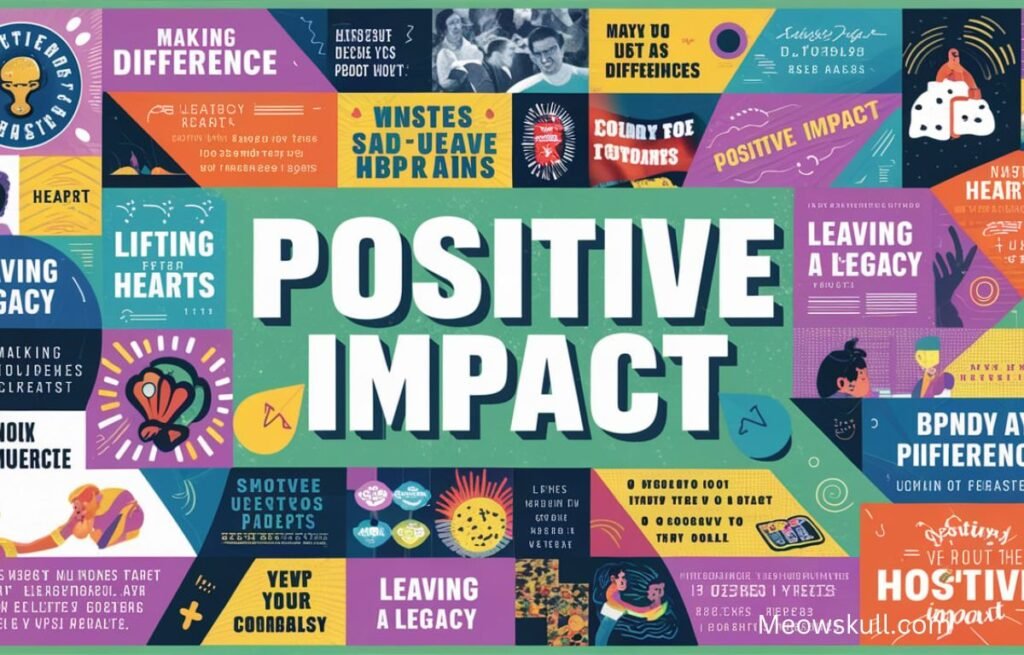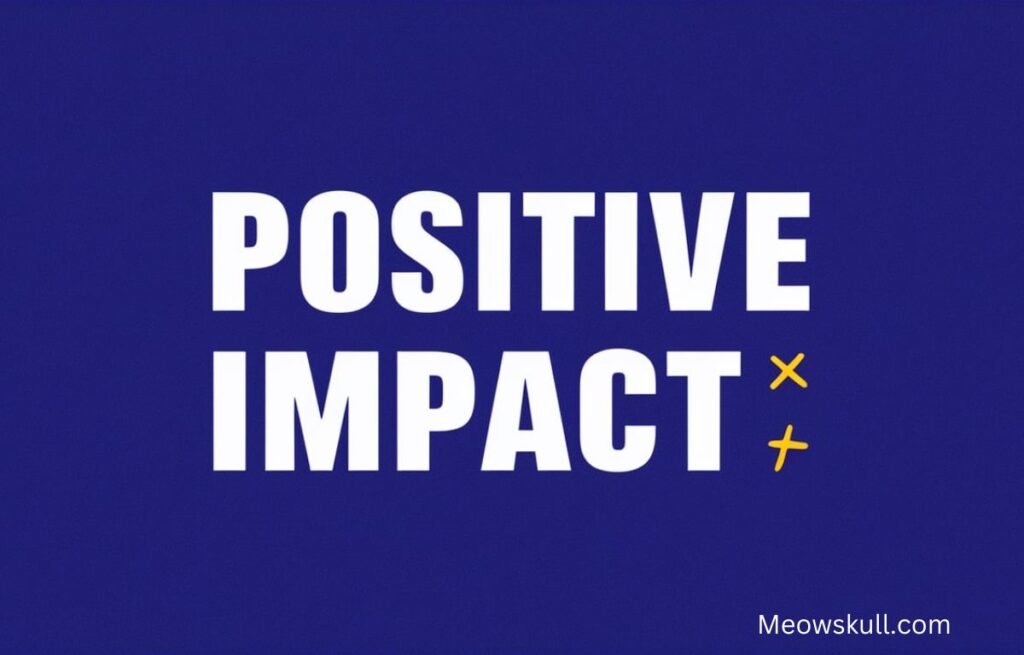When discussing the influence of actions, decisions, or strategies in both personal and professional settings, the phrase “positive impact” often comes up. However, in the world of communication, variety is key to keeping your audience engaged and avoiding redundancy. Whether you’re writing a business report, crafting a speech, or simply engaging in conversation, having alternative expressions for “positive impact” can elevate your language and convey your message more effectively.
In this article, we’ll explore 17 different ways to express the idea of a “positive impact”. These alternatives will not only add richness to your vocabulary but also help you communicate with precision and creativity.
1. Beneficial Effect
A “beneficial effect” implies that the outcome of a particular action or event is favorable and advantageous. This phrase is particularly useful in professional and academic contexts where the focus is on the tangible benefits brought about by a decision or strategy.
Example: The new employee wellness program had a beneficial effect on staff morale and productivity.
2. Constructive Influence
Using “constructive influence” suggests that the impact of something is not just positive but also helps in building or improving something. This phrase is ideal when discussing changes that lead to growth, improvement, or development.
Example: Her mentorship had a constructive influence on the team’s approach to problem-solving.
3. Favorable Outcome
“Favorable outcome” is a straightforward alternative that focuses on the positive results of an action or decision. It is particularly effective in situations where the emphasis is on the end result.
Example: The negotiations between the two companies resulted in a favorable outcome for both parties.
4. Positive Contribution
When you want to highlight the role of a particular action or person in bringing about a positive change, “positive contribution” is an excellent choice. This phrase works well in both formal and informal settings.
Example: Her innovative ideas made a positive contribution to the success of the project.
Also Read: 19 Other Ways To Say “Thank You for Your Kind Words”
5. Transformative Effect

“Transformative effect” is a powerful phrase that suggests a significant and positive change. This term is particularly useful when discussing changes that have a profound impact on a situation or organization.
Example: The new leadership brought about a transformative effect on the company’s culture.
6. Advantageous Impact
“Advantageous impact” emphasizes the beneficial aspect of an action or event, particularly in terms of the advantages it brings. This phrase is well-suited for business and academic contexts.
Example: Implementing the new software had an advantageous impact on our operational efficiency.
7. Productive Outcome
A “productive outcome” suggests that the results of an action or decision are not just positive but also lead to further progress or success. This phrase is ideal for use in contexts where the focus is on the effectiveness and productivity of a decision.
Example: The team’s collaboration led to a productive outcome, resulting in increased sales.
8. Meaningful Contribution
“Meaningful contribution” highlights the significance and value of an action or input. This phrase is particularly effective in discussions about the importance of individual or collective efforts in achieving a goal.
Example: His volunteer work made a meaningful contribution to the community.
9. Positive Resonance
When something has a “positive resonance”, it means that it has left a lasting, favorable impression. This phrase is ideal for discussing ideas, actions, or decisions that continue to have a positive effect over time.
Example: The campaign had a positive resonance with the target audience, boosting brand loyalty.
Also Read: 19 Other Ways To Say “Looking Forward to Working With You”
10. Enriching Experience

An “enriching experience” is one that adds value and depth to someone’s life or knowledge. This phrase is often used in personal development or educational contexts to describe experiences that have a lasting positive impact.
Example: Traveling abroad was an enriching experience that broadened her perspective.
11. Uplifting Influence
“Uplifting influence” conveys a sense of inspiration and positive energy that comes from an action or person. This phrase is particularly useful in contexts where the focus is on emotional or motivational impacts.
Example: Her words had an uplifting influence on everyone at the meeting.
12. Constructive Outcome
A “constructive outcome” implies that the results of an action are not just positive, but they also lead to further improvements or growth. This phrase is ideal for situations where the emphasis is on building or enhancing something.
Example: The workshop resulted in a constructive outcome, with participants gaining new skills and insights.
13. Encouraging Result
“Encouraging result” is a phrase that highlights the positive and motivating nature of an outcome. This term is often used in contexts where the outcome provides hope or motivation for further efforts.
Example: The initial tests showed an encouraging result, prompting further research into the new treatment.
14. Empowering Effect
An “empowering effect” suggests that the positive impact of an action or event enables others to take control or improve their situation. This phrase is particularly powerful in discussions about personal growth, education, or social change.
Example: The training program had an empowering effect on the participants, giving them the confidence to take on leadership roles.
15. Value-Adding Impact
“Value-adding impact” emphasizes the enhancement or added value that results from an action or decision. This phrase is ideal for use in business contexts where the focus is on the tangible benefits brought by a strategy or innovation.
Example: The new product line had a value-adding impact on the company’s market position.
Also Read: 17 Other Ways to Say “Thank You for Clarifying”
16. Positive Ripple Effect

The phrase “positive ripple effect” suggests that the initial positive action or event leads to further positive outcomes, spreading like ripples in water. This term is particularly effective in describing the extended influence of a decision or action.
Example: The charity event created a positive ripple effect in the community, inspiring others to contribute.
17. Inspiring Change
“Inspiring change” implies that the positive impact of an action or decision has motivated or encouraged others to take action or make improvements. This phrase is ideal for discussions about leadership, innovation, or social movements.
Example: Her leadership style was instrumental in inspiring change within the organization.
Conclusion
Incorporating a variety of expressions into your vocabulary not only enhances your communication skills but also helps you convey your message more effectively. By using these 17 alternatives to “positive impact,” you can keep your language fresh, engaging, and impactful. Whether you’re writing a report, giving a presentation, or simply having a conversation, these phrases will help you articulate the positive effects of actions and decisions with greater clarity and nuance. Remember, the key to effective communication is not just in what you say, but how you say it.
FAQs
What is the best way to say “positive impact” in a professional setting?
In a professional setting, using terms like “beneficial effect,” “favorable outcome,” or “constructive influence” can convey the idea of a positive impact effectively. These phrases are formal and precise, making them ideal for business reports, presentations, and academic papers.
How can I describe a positive impact in personal communication?
For personal communication, phrases like “uplifting influence,” “enriching experience,” or “empowering effect” are excellent choices. These terms are warm and expressive, making them suitable for conversations, emails, or speeches.
Why is it important to use different expressions for “positive impact”?
Using a variety of expressions for “positive impact” helps to keep your language engaging and avoids repetition. It also allows you to tailor your message to the specific context, ensuring that your communication is clear and effective.
Are there any synonyms for “positive impact” that imply long-term effects?
Yes, terms like “positive ripple effect” and “transformative effect” suggest that the positive impact has long-lasting or far-reaching consequences. These phrases are particularly useful when discussing outcomes that will continue to influence a situation over time.
How can I describe a positive impact in a creative way?
If you want to be more creative, you can use phrases like “inspiring change” or “positive resonance.” These expressions are more evocative and can add a layer of emotion or depth to your communication.
Can I use these alternatives in formal writing?
Absolutely. Many of the alternatives provided, such as “advantageous impact” and “productive outcome,” are suitable for formal writing. They offer a professional tone while still conveying the positive nature of the impact.
What are some phrases that highlight the significance of a positive impact?
Phrases like “meaningful contribution” and “value-adding impact” emphasize the importance and significance of the positive impact. These terms are particularly effective when you want to highlight the value or importance of an action or decision.
How do I choose the right synonym for “positive impact”?
Choosing the right synonym depends on the context and the message you want to convey. Consider the tone (formal or informal), the audience (professional or personal), and the specific nature of the impact (short-term or long-term) when selecting the most appropriate term.
Are these alternatives universally understood?
Most of these alternatives are widely understood, especially in professional and academic contexts. However, it’s always a good idea to consider your audience and ensure that the terms you choose are familiar and clear to them.
Can using these alternatives improve my communication skills?
Yes, expanding your vocabulary and using varied expressions can significantly enhance your communication skills. It allows you to articulate your thoughts more clearly and engage your audience more effectively, whether in writing or speaking.

As a seasoned contributor to “Meowskull”, Rosalie combines her linguistic prowess with a keen understanding of various topics, ensuring a delightful and informative reading experience. Her articles effortlessly blend clarity, creativity, and a touch of elegance, making language exploration an exciting journey for readers.